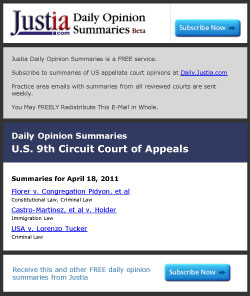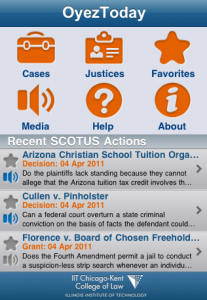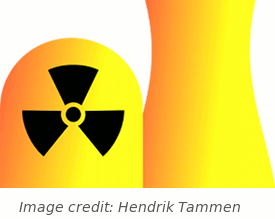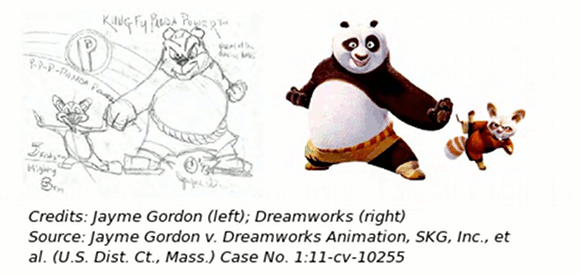 Courtney and I wanted to update you on our latest free law offering, Justia Daily Opinion Summaries. When we announced the launch last week, we noted that our jurisdictional coverage included all Federal Circuit Courts of Appeal and select state supreme courts. The team has been working hard to expand to even more jurisdictions and we’re pleased to say that we now offer summaries for over half the 50 U.S. states. To see a complete list of our current offerings by jurisdiction and by practice area, go to our subscription page at http://daily.justia.com. For the few remaining states that aren’t available yet, stay tuned. We’ll be adding more in the upcoming weeks.
Courtney and I wanted to update you on our latest free law offering, Justia Daily Opinion Summaries. When we announced the launch last week, we noted that our jurisdictional coverage included all Federal Circuit Courts of Appeal and select state supreme courts. The team has been working hard to expand to even more jurisdictions and we’re pleased to say that we now offer summaries for over half the 50 U.S. states. To see a complete list of our current offerings by jurisdiction and by practice area, go to our subscription page at http://daily.justia.com. For the few remaining states that aren’t available yet, stay tuned. We’ll be adding more in the upcoming weeks.
Articles Posted in Legal Research

Who is an American? For a “corporate person,” does the answer depend on where the corporation is headquartered? Or, should we look at the composition of its workforce? Last week, I looked at some tax data found in various securities filings to calculate the tax rate paid by various corporations. Today, I wanted to see how “American” some American companies really were by digging through employment data from the SEC EDGAR System.
EDGAR features a repository of financial data that companies have filed with the U.S. Securities and Exchange Commission. From registration statements to annual reports, EDGAR offers a detailed glimpse at the state of various domestic and foreign businesses.
Hi Friends!
 Today Cicely and I are pleased to announce Justia’s newest free law offering: FREE Daily Opinion Summaries of all Federal Circuit Courts of Appeal and select State Supreme Courts!
Today Cicely and I are pleased to announce Justia’s newest free law offering: FREE Daily Opinion Summaries of all Federal Circuit Courts of Appeal and select State Supreme Courts!
Our Daily Opinion Summaries deliver clear, concise summaries of breaking court opinions right to your in-box. The summaries are tagged by practice area so that readers can quickly identify which opinions are relevant to their practice. This is a powerful tool for attorneys, journalists, and others looking to keep up with latest developments in the law. All summaries are written by licensed attorneys.
How to subscribe
To subscribe, visit the Justia Subscriptions Page at Daily.Justia.com. If you already have a Justia account, sign in to subscribe right away. If you are not yet registered, it’s fast and free! Once registered, simply choose the jurisdictions and practice areas of interest to you.
 Twice, I’ve reviewed PocketJustice by our friends at Oyez: a great app for the iPhone, iPad, and Android devices for researching US Supreme Court Cases. Despite the strengths of PocketJustice, it lacked an easy way to follow current Supreme Court developments. It seems our friends at Oyez were aware of that, and have decided to release another app called OyezToday. This app for the iPhone and iPod touch is completely free through a sponsorship from IIT Chicago-Kent College of Law.
Twice, I’ve reviewed PocketJustice by our friends at Oyez: a great app for the iPhone, iPad, and Android devices for researching US Supreme Court Cases. Despite the strengths of PocketJustice, it lacked an easy way to follow current Supreme Court developments. It seems our friends at Oyez were aware of that, and have decided to release another app called OyezToday. This app for the iPhone and iPod touch is completely free through a sponsorship from IIT Chicago-Kent College of Law.
Much of the app works just like PocketJustice in that it shares the same features: bios of Supreme Court Judges, an archive of cases, and oral arguments with transcripts that follow along with playback. Unlike PocketJustice, however, this app is limited to much more current cases.
 I want to follow up on a previous post I wrote back in October that, in part, discussed open access in scholarship and The Durham Statement. As a reminder, and for those of you who might be new to this party, The Durham Statement, “calls for all law schools to stop publishing their journals in print format and to rely instead on electronic publication coupled with a commitment to keep the electronic versions available in stable, open, digital formats.”
I want to follow up on a previous post I wrote back in October that, in part, discussed open access in scholarship and The Durham Statement. As a reminder, and for those of you who might be new to this party, The Durham Statement, “calls for all law schools to stop publishing their journals in print format and to rely instead on electronic publication coupled with a commitment to keep the electronic versions available in stable, open, digital formats.”
An article was published recently as a part of The University of Georgia Law School Research Paper Series, “Citation Advantage of Open Access Legal Scholarship,” which helps to further promote the proposition that opening up this secondary source material in digital format provides real benefits. Not only does this advance the greater philosophical principals of knowledge as a human right and a public good, but open access can positively impact the work and reputation of law faculty by supporting their professional goals to get their work published and, more specifically, cited, which is now a common benchmark used in tenure review.
 Watching events unfold at Japan’s Fukushima Daiichi Nuclear Power Plant over the past week have reminded me how little I really know about how nuclear power is regulated. While reading about and listening to commentary on the crisis has better acquainted me with the work and analysis of U.S. and international organizations that oversee and promote the operation of this technology, I still thought it might be useful for those of you who are interested, like me, in learning more on the issues to prepare a compilation of information and resources related to nuclear power laws, regulations and organizations.
Watching events unfold at Japan’s Fukushima Daiichi Nuclear Power Plant over the past week have reminded me how little I really know about how nuclear power is regulated. While reading about and listening to commentary on the crisis has better acquainted me with the work and analysis of U.S. and international organizations that oversee and promote the operation of this technology, I still thought it might be useful for those of you who are interested, like me, in learning more on the issues to prepare a compilation of information and resources related to nuclear power laws, regulations and organizations.

It’s that time again, dear Justia readers, when we give you a Top Ten rundown of last month’s most popular Onward blog and Facebook posts.
 In October, I wrote about the PocketJustice iPhone app from our friends at Oyez. Since then they’ve released an iPad version (called PocketJustice HD) which takes advantage of the larger screen real estate to make researching faster.
In October, I wrote about the PocketJustice iPhone app from our friends at Oyez. Since then they’ve released an iPad version (called PocketJustice HD) which takes advantage of the larger screen real estate to make researching faster.
Friday, they released both PocketJustice and PocketJustice Full for the Android Marketplace. The Android version is much like the iPhone version, although thanks to Android phones having dedicated search and menu buttons, the Android version doesn’t waste as much screen real estate for a menu on the bottom of the screen.
Legal researchers in a hurry are also benefitted on the Android version by having access to Android’s voice search which allows you to say the name of a case and have your phone do the typing for you.
Attention spans are getting shorter. You can only tweet 140 characters. Courts have pleading length restrictions. Judges’ case dockets are packed.
So, how can you get your case to seize the attention of the judge?
If you can use an image that makes a powerful, effective statement about your client’s stance in the case — e.g., putting a picture of your copyrighted work next to the allegedly infringing work — you could grab the judge’s (or her law clerk’s) attention.
 This week, I want to point our readers over to a recent post by Joe Hodnicki at the Law Librarian Blog. Joe notes a letter sent recently to the Librarian of Congress, James H. Billington, requesting that Dr. Billington appoint a Director of the Congressional Research Service (CRS) to assist in the release of unclassified and non-confidential CRS Reports. Among others, the American Association of Law Libraries, Citizens for Responsibility and Ethics in Washington, Free Government Information, Public Citizen and the Sunlight Foundation signed the letter. (A full list appears in the blog post.)
This week, I want to point our readers over to a recent post by Joe Hodnicki at the Law Librarian Blog. Joe notes a letter sent recently to the Librarian of Congress, James H. Billington, requesting that Dr. Billington appoint a Director of the Congressional Research Service (CRS) to assist in the release of unclassified and non-confidential CRS Reports. Among others, the American Association of Law Libraries, Citizens for Responsibility and Ethics in Washington, Free Government Information, Public Citizen and the Sunlight Foundation signed the letter. (A full list appears in the blog post.)
The letter speaks to the accessibility of these valuable public policy (and public domain) documents, which are prepared by the Congressional Research Service for the members and staff of the U.S. Congress. While U.S. taxpayers spend nearly $100 million to fund the CRS, Congress does not disseminate the reports in any systematic way, and no comprehensive list of these reports is even publicly available from which to request reports.
I know it’s not lost on most of you that this is a movie we’ve seen before (or, rather, we see time and time again). It’s time to remove the barriers to access and paywalls we see that surround all public domain legal and government materials.
